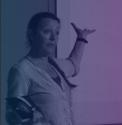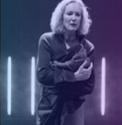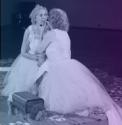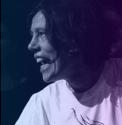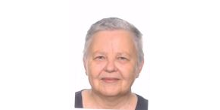The World as Stage - applied philosophy of a life
February 2021
Keywords: Narrative Research, Autoethnography, Consciousness, Psychodrama, Globalisation
A Life on the World Stage
The last but one Magdalena Online, the one I attended, gave me a lot to think about.
I think the aha-moment for me came when one woman spoke of her practice – something she does every day. I like that. Very much. At the heart of theatre is – daily practice.
At the age of 14, 15 for two years I held a student subscription and - fell in love with Peter Palitzsch’s Contemporary Theatre, in Stuttgart. Later I learned that his life’s motto had been ‘Theatre simply has to change the world’ and – it certainly did that for me: It gave me much needed hope in the changeability of the world.[1]
That hope, that belief led me to some practical activities in my early twenties. Some of these I have documented in a talk at the University of Utrecht last summer.[2]
In my early thirties, as a single parent, when I felt I was getting nowhere fast and had to make a drastic and very difficult life-changing decision – I came to play and act-in: Psychodrama, with a uniquely qualified feminist tutor in a unique feminist residential college.
Two things happened there: First, when observing the tutor acting on stage, I could practically see her acting out – the Light of the Universe. Later I found that liberating quality in acting as an antagonist - not directed by a therapist's intentions - that liberating quality of PD, somewhat eccentrically represented in J.L. Moreno’s work.[3] These days, I prefer the way contemporaries have rephrased Shakespeare’s saying ‘The World is nothing but a stage…’ Therein, for me, lies a felt-sense of Freedom which in fact had reached me as a young child, in a silent transpersonal experience, years before theatre did. Psychodrama directors tkae note: Not guided work as a protagonist, but presence as an antagonist, led me to a powerful insight in solitude at break time that changed my life forever.[4]
My high sensitivity and the spirituality I needed to research after I awoke to and through Psychodrama did not deserve to be exposed to the full Psychodrama Training as offered in Germany at the time, dominated as it was by practitioners from a background with reductionist medical model. Instead, I started a process of action research using the techniques of PD in Adult Education.[5] Apart from an opportunity to relive my joy in being on stage, to my own surprise, I felt intuitively guided in using the techniques: Experiences that helped others and myself.
Having first relocated to Britain in my early forties, at 46 I entered a research sabbatical in North Wales, writing up my philosophical research of the autoethnography question how meeting Life at Life’s terms can become an initiation – potentially more authentic and deeper than religion: The work that concluded some 17 years of independent study is essentially a conceptual study. [6]It also includes reference to a pending second part: Writing up of my real-life koans, my companions on the way. Here I see Basho, the haiku pilgrim, as a kindred spirit. Alas, my own narrative writing is rather not fit for the comparison.[7]
Living in the solitude of North Wales, I found not only the quiet I needed for my philosophical study, but also an opportunity to perform on stage at Coleg Harlech and a studio at the University of Aberystwyth. Most importantly, in Aberystwyth I also met the late Melbourne Actress Margaret Cameron (Knowledge and Melancholy). In personal communication with her, in admiration, I tried not very hard to convey one question that I could not quite put into words: Something, I felt, was missing from her Performance to make it as cathartic as theatre can be. In fact, I have only very recently found words for what I meant: Through the Trauma Research Foundation, I met yoga teacher Matt Sanford who described his own action research into felt-sense awareness of silence in his paralysed body he intuitively knew he had and later cultivated through yoga.
So, one way or the other, living with that awareness has been and remains my daily practice in the world that is my stage. As Matt Sanford says, this awareness can isolate or connect… While I love solitude as part of my practice, there is still more work ahead to connect me with the world. One inspiring aspect I found in Nancy Hillis' work on creativity in and through abstract painting. But when it comes down to it - I am content and inspired in looking at Kandinsky.
More sustenance seems to be in the adaptive yoga practice and heartfelt meditation. At the moment I certaionly need the former to manage symptoms of CFS - perhaps they are teaching me to look deeper within? So maybe Sandra Ingerman;s book 'Walking in Light' which I have just received may hold some answers - it promises to introduce the non-shaman to principles of looking at reality deep.
Fittingly, a brief review of my work starts with Prof. Andrew Basden’s reference to art:[8] ‘… We are Artists – our Medium is life itself’.
As an Adult/Mental Health Senior Social Worker in my fifties, I had the opportunity to reflect on my own way of having survived trauma – as referred to in the presentation under footnote 2. Surviving prolonged emotional abuse may indicate some traits at least of PTSD. However, the sense of meaning in and beyond it all and a degree of earnestness with it, combined with a wicked sense of humour, rather indicate that I may in fact be somewhere on the AS-scale. Ever since I heard psychiatry-survivor Jacqui Dillon (now Dr.) talk – ‘We are all on the spectrum of human experience’[9] I have begun making sense of and making peace with my awkwardness in social gatherings, an element of executive functioning difficulties as well as my ability and need to think deep, original and critical. As I described in Utrecht, the call to conscientious action arrived, from beyond my doing, – but with hindsight, it need not have been a surprise. - In personal conversation with Chris Goodchild[10] a few years ago, we discussed the possibility the gift of AS being a degree of openness to deeper or higher levels of consciousness, kind of ‘light-on’ awareness neurotypical people may need laborious meditation practice to reach. Be that as it may, personally I am grateful to have stayed away from medical model diagnosis/services – rather created a patchwork quilt of the existential challenges in my life.
As it may become more relevant - people are seeking a new orientation after the world crisis that is the current pandemic - , as a responsible academic, in looking forward, I finally include here my attempt at dabbing in applying my experience to Globalisation and Higher Education, where depth and width may be much needed in creative systems thinking.[11]
What I would still like to work out/work in to my original writing in more detail:
- The contribution adults learning in psychodramatic play can make as in affecting social change[12],
- Role of individual conscientious action as contributing to social change[13]
[2] www.cambridge.org/engage/coe/article-details/5fa5760efc3a990012f895c8 An audio version is available upon request in mp3
[4] See www.cambridge.org/engage/coe/article-details/5fa57fbd92220e0012555d1a (peer-reviewed)
[5] As referred to in footnote 2.
[7] See Robert Aitken, A Zen Wave – Basho’s Haiku and Zen, Washington, 1978
[9] See www.jacquidillon.org, quoted from memory, ca 2007 during a public speech
[10] Ambassador foe the Autism Society and spiritual author, see www.pathwaystogod.org/resources/profiles/chris-goodchild; quoted from memory
[11] https://www.academia.edu/36748307/SRHE2002_Free_to_Act; the term CST I gratefully borrow from Prof Christopher Chase; see https://creativesystemsthinking.wordpress.com/tag/creative-systems-thinking/
[12] As a felt-sense person, in this regard I am not satisfied with Moreno’s concept of Soziometrie (see G.Leutz, Psychodrama, Springer 1974
[13] Katharine Gun and author Marcia Mitchell seem to ask similar questions, see ‘Official Secrets’, William Collins 2019

